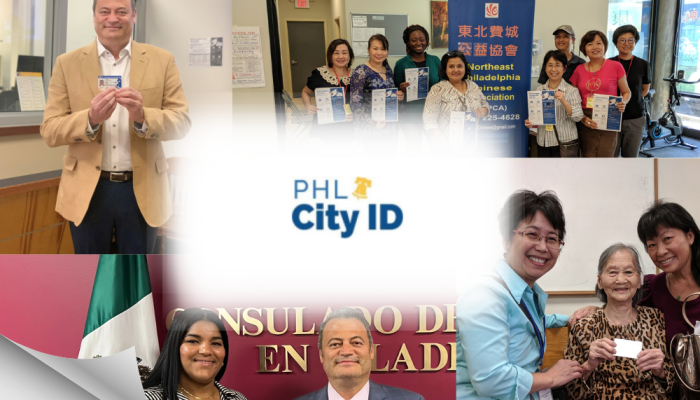Since the launch of the Municipal ID Program (PHLCityID) in 2019, the program’s mission has stayed razor-focused: to ensure Philadelphia remains a welcoming city that embraces everyone who lives here. The program is inclusive by offering a secure and affordable photo identification card to individuals in need – regardless of race, ethnicity, gender identity, immigration status, incarceration history, or housing status. It aims to provide crucial support to those facing obstacles in obtaining other forms of identification due to financial constraints or barriers.
Fast forward to 2024, the program has issued over 75,000 ID cards and remains a token of hope — bringing benefits, a sense of community, and belonging to individuals who otherwise may not have access to equitable resources.
Pearl Mingchu Huynh, Founder and President of the Northeast Philadelphia Chinese Association, Carlos Obrador Garrido and Raúl García Zentlapal, Head Consul and Deputy Consul of the Philadelphia Consulate of Mexico, and Khalil Morrison, Assistant Director of the City of Philadelphia’s Office of Reentry Partnerships (ORP), share their perspectives on the positive impact this program has had on all its participants. They share how a simple card has made such a significant impact on many people’s lives.
Expanding Access to Services in the Chinese Community
Pearl, of the Northeast Philadelphia Chinese Association, spoke about her organization’s mission and the ways the PHLCityID program has assisted her in meeting the goals of the mission for over 400 non-English speaking individuals.
“My organization provides resources and information to help non-English-speaking Chinese communities in the Northeast – many who don’t have legal documents,” said Pearl. “Undocumented seniors are among the most vulnerable. Some seniors walk onto the streets and often get lost. People don’t know who they are or how to help them. Initially, we created the Senior Project, providing informal IDs for those in need.
Pearl shared additional ways this program has helped her fulfill the organization’s mission.
“During COVID, the PHLCityID was critical and allowed some of our participants to get access to free food programs, health centers, treatment, work opportunities, and government assistance,” said Pearl. “The program also helps youth and children under 18 so they can apply for jobs and it benefits seniors and those who do not have any legal proof of address. Overall, the PHLCityID gives people a sense of community and makes them feel good, whether they are documented or undocumented.”
It’s More than Just an ID
Carlos Obrador Garrido, the Head Consul of the Philadelphia Consulate of Mexico in Philadelphia, told us that in Philadelphia, we have approximately 100,000 Mexican nationals. “Obtaining any type of ID is an advantage to this community,” said Garrido. “The City ID helps people receive medical assistance, file taxes, open bank accounts and apply for loans. It even helps to enroll children in school, since you generally need to provide an ID to enroll. IDs gives people who live, work, and contribute to the city, a sense of belonging.”
“We are not just talking about an ID, but the possibility to access and exercise basic human rights,” said Deputy Consul Raúl García Zentlapal. “The right to an identity, to us, is a human right. We look forward to working with this program because it makes lives easier and better for all of us. It gives people peace of mind because they have something to identify themselves, especially for the most vulnerable community, the undocumented community. Some health centers will cover medical expenses when you present a city ID. It changes their lives.”
Supporting Returning Citizens
Kahlil Morrison at the City of Philadelphia’s Office of Reentry Partnerships partners with PHLCityID since they know that formerly incarcerated individuals have acknowledged great benefits of having the ID soon after they re-enter society.
“Not having a photo ID is a huge barrier our participants face,” said Morrison. “The program offers them an opportunity to receive valid identification, which helps to remove critical barriers to their successful reintegration into the community,” he said. “Some challenges our participants face include lack of sustainable employment, enrollment in public benefits, supportive housing, and more, which is why, in the last year, ORP helped 200 participants with getting a PHLCityID. Many often feel more validated as contributing members of the community by obtaining the ID.”
These stories show that the PHLCityID program truly makes a remarkable impact on the lives of Philadelphia residents, regardless of background and origin. It continues to provide a sense of community and belonging, reflecting the City of Philadelphia’s commitment to inclusivity and support for all its residents. As the program celebrates its 5th anniversary and reaches a milestone of 75,000 distributions, it is evident that the PHLCityID has become a symbol of hope, growth, and opportunity, embodying the values of equality and empowerment for all.

